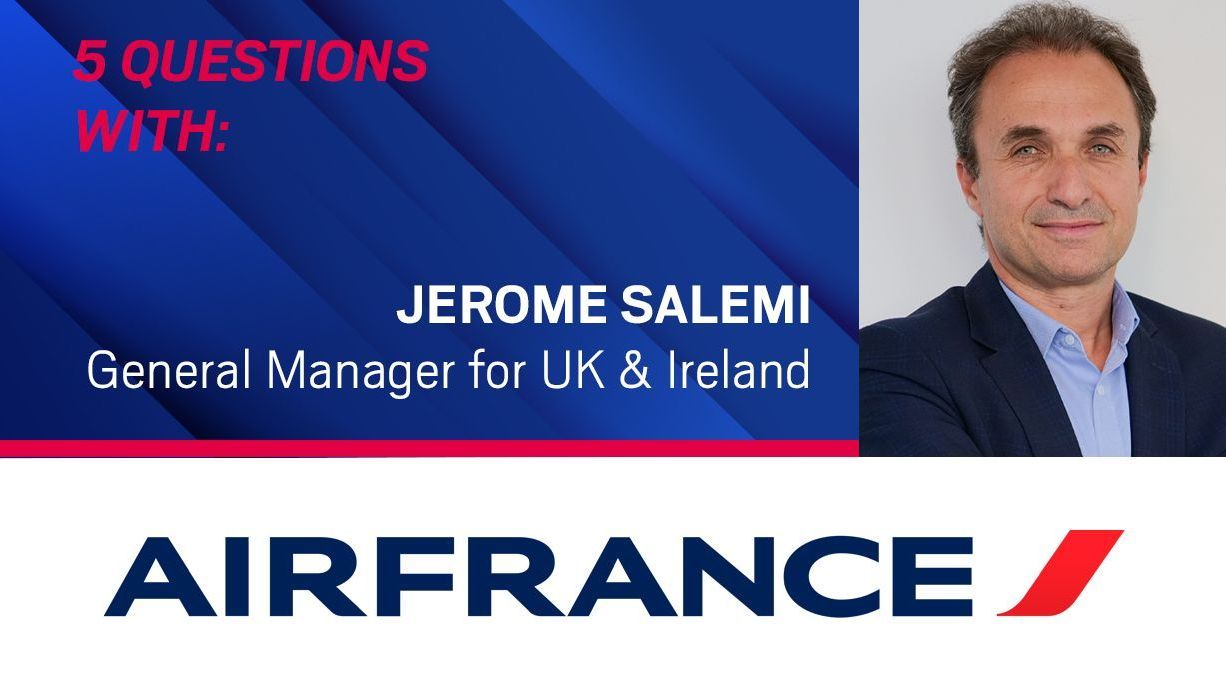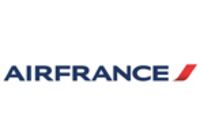Interview • Members
Five questions with Jerome Salemi, General Manager for UK & Ireland, Air France-KLM

Meet Jerome Salemi, our recently welcomed Patron Member and General Manager UK & Ireland of Air France-KLM. From pioneering sales strategies to navigating global crises, Jerome offers unique insights into the aviation industry's inner workings. He reflects on key lessons learned from his diverse roles, shares perspectives on Air France-KLM's strategic positioning in the UK and Ireland, and outlines the Group's commitment to sustainability and future growth.
With more than 20 years at Air France-KLM, your professional journey has been marked by key experiences such as VP Sales Policies and General Manager for Mexico, North Africa and the East Mediterranean. What lessons have you learned from these different positions?
One of the beauties of working for an international Group is that you get the opportunity to live in different countries and experience different cultures. On the personal side, the main challenge was to align my career path with my wife’s career. The second challenge was the need for us, as a family, to adapt to completely new environments every few years. The French schooling system helped a lot in this aspect as it brought continuity when moving from one country to another. On the professional side, I was involved in a lot the different situations: implementing our joint venture with Delta Air Lines in Mexico, opening the Cancun-Paris route, lobbying for the A380 to land at Mexico City Airport, developing Air France-KLM operations in Morocco, Tunisia, Algeria and then in Italy, Greece, Turkey, and Israel while deeply transforming the local organisations. These 10 years abroad were very insightful and intense when it came to managing projects and leading people. Shortly after going back to Paris and settling into a commercial role at our Head Office, we were hit with the COVID-19 pandemic. My job completely changed as I became responsible for the ticket refund processes from a policy perspective at a moment when the Air France-KLM Group and the rest of the airline industry had to cancel up to 95% of their operations. Three years later and with the crisis behind us, I am delighted to have joined the Air France-KLM team in the UK and Ireland with a strong wish to understand and act on this key market for the Group.
Could you present Air France KLM Group in the UK and Ireland? What are your main challenges in 2024?
The market in the UK and Ireland is the highest ranking in terms of revenue for Air France-KLM in Europe, excluding our home markets France and the Netherlands around €900M in 2024. A lot of members within the Chamber of Commerce who use other modes of transport to get to France might wonder how Air France-KLM can generate such a high revenue target here! Well, our main target group is the long-haul traffic via our hubs in Paris-CDG and Amsterdam. South Africa, Nigeria, Ghana, Japan, and Brazil are our top long-haul destinations! London Heathrow is the number 1 international airport for the Air France-KLM Group, with 15 daily flights connected to Amsterdam, Paris-CDG and Nice. While Air France is present in 7 Airports (London Heathrow; Manchester; Birmingham; Edinburgh; Newcastle; Dublin; Cork), KLM operates in 19 Airports (airports listed above + Aberdeen; Belfast; Bristol; Cardiff; Glasgow; Humberside; Inverness; Leeds Bradford; London City; Norwich; Southampton; Teesside) which is more departure points than British Airways!
The Air France-KLM Group, including Engineering & Maintenance, European Sales & Services, and other subsidiaries, currently employs 1,100 employees in the UK and Ireland. I am personally leading the teams in charge of Commercial and Operations activities.
We have been working around key priorities: have our staff highly engaged, deliver the best quality of service, generate the expected revenue, and control our costs, while being a more sustainable business. In a challenging context: the macroeconomics in the UK and our high sensitivity to any new geopolitical development make our forecast of air demand and average ticket price quite unpredictable. Staffing and skilling issues are particularly critical in our airports to handle the flights (even though we expect significant improvements in 2024). Lastly, pressure on cost remains high with a higher inflation rate locally than in Europe.
Air France-KLM Group's success is evident through its leadership in air transport, diverse expertise, and a substantial global presence. Can you share your perspective on the key elements you believe contribute to the success of the group?
The Air France-KLM Group operates one of the most extensive balanced flight networks between Europe and the rest of the world, thanks to the influence of its two international hubs: Paris-Charles de Gaulle and Amsterdam Airport Schiphol.
In 2023, the 3 brands of the Group, Air France, KLM Royal Dutch Airlines, and Transavia served 300 destinations in 120 different countries. Paris and Amsterdam are clear assets for the Group as leading cities in terms of international tourism and business travel. While KLM benefits from the fluidity of the Schiphol hub with easy and quick connections, Air France positions itself on both the premium local and connecting traffic, with a rationalised, more modern, comfortable, and efficient fleet. Both Air France and KLM offer a wide range of products and services, Economy, Premium Economy, and Business Class, and for Air France, the state-of-the-art La Premiere service, is recognised by the customers as one of the best in the world. Transavia, the low-cost carrier of the Group, has been growing fast in the leisure market, operating out of the Netherlands and France, particularly Orly, mostly to Mediterranean destinations.
If we add the cargo and maintenance expertise, our Flying Blue loyalty program with its 22 million members, and our many airline partnerships such as the joint venture with Delta Air Lines and Virgin Atlantic on the North Atlantic routes, Air France-KLM is emerging from this unprecedented period more competitive and committed to creating a more sustainable travel sector.
Air France - KLM works to reconcile growth, environmental protection, social value, and local development at all hubs and destinations. How do you intend to balance the group's leadership with these goals in the context of your role?
Indeed, the overarching ambition of Air France-KLM is to become an aviation champion in Europe, while fulfilling its role as a pioneer in sustainable aviation. We assume our responsibilities as an employer, airline group and corporate citizen. As an integral part of our activities and operations, we strive to support most of Agenda 2030 for Sustainable Development’s Goals, voted by the United Nations in 2015. Let me highlight 3 of them, in relation to our presence in the UK:
- We are contributing to “Gender Equality” by working on professional equality between men and women, and by promoting diversity and inclusion across the business and in our value chain. 63% of my extended management team is composed of women. We are very careful to ensure all our decisions and initiatives are as inclusive as possible: recruitment, promotions, personal development, team activities, etc.
- We are contributing to “Affordable and Clean Energy”. We are constantly reducing the energy consumption of our ground operations, improving our energy efficiency, and increasing the proportion of renewable energy for the power supply in our buildings. One example of our commitment is our investment in a fleet of electric ramp equipment and vehicles. We are also investing massively in more sustainable aircraft, and we are happy to operate the London Heathrow - Paris route with the A220 fleet only, which reduces fuel consumption by 20% in comparison to the old generation A320. Finally, our contribution to the development of sustainable aviation fuel, our first lever in decarbonisation, enables us to reduce the use of fossil fuel energy.
- We are contributing to “Decent Work and Economic Growth” By contributing to inclusive and sustainable economic growth in France, the Netherlands, and the regions where we operate, including the UK of course. We provide qualified jobs with high added value, and we promote the employability and personal development of our employees thanks to training. We create direct economic activity with our 1,100 employees and indirectly via our supply chain.
The group aims to become a champion of air transport in Europe while fulfilling its role as a pioneer of sustainable aviation, with a focus on decarbonisation. Considering this particularly important challenge, can you outline concrete strategies and initiatives you believe are/will be effective in the future?
The Air France-KLM Group is considered a frontrunner in the airline industry when it comes to decarbonisation. With a clear ambition for 2030, which is the first step to reaching our Net Zero Carbon emission target by 2050.
Air France-KLM has developed a decarbonisation strategy that aims to reduce its emissions per passenger/kilometre by 30% by 2030 - compared to 2019 levels, through 3 main levers:
- Fleet renewal with new-generation aircraft: The Airbus A220s, Airbus A350s, Boeing 787s are more fuel-efficient, producing up to 25% less CO2 emissions, and with a noise reduction level of 33% on average. By 2028, these aircraft will account for 64% of the Air France-KLM Group fleet, thanks to an annual investment of two billion euros.
- Operational measures: Ground operations, eco-piloting measures and other initiatives made possible by the actions of Air France-KLM crews and ground staff trained in these practices enable an average reduction of 4 to 5% in CO2 emissions.
- Increased use of sustainable aviation fuel (SAF), which reduces CO2 emissions by at least 75% on average over the fuel's life cycle and does not compete with the food chain. By 2030, the Group aims to incorporate at least 10% SAF on all its flights, and 63% by 2050.
The Air France-KLM Group is fully committed to reducing its carbon footprint. In 2022 and 2023, the Group was the world’s largest user of SAF, representing 16% of the world’s total SAF production. By comparison, the Group only accounts for 3% of the world’s consumption of conventional kerosene. However, SAF still represented less than 1% of our jet fuel consumption, therefore we are only at the beginning of this journey.
By signing several long-term offtake agreements in the past 2 years (with Neste, DG Fuels, Total Energies, etc.), our strategy is to support the development of the SAF production industry. By increasing use and demand, Air France-KLM aims to play its part in increasing the scale of commercial SAF production for wider adoption by 2030. SAF is key for the future as electric, or hydrogen aircraft will not be ready for commercial aviation before 2035 and will probably be suitable for short-distance travel only.
